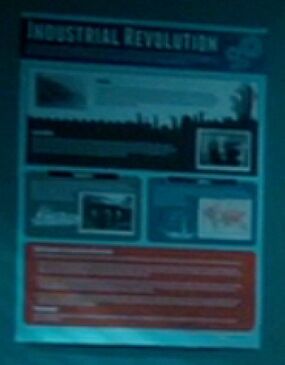Industrial Revolution: Difference between revisions
66 Seconds (talk | contribs) No edit summary |
66 Seconds (talk | contribs) No edit summary |
||
| Line 3: | Line 3: | ||
The '''Industrial Revolution''' began in the late [[18th century]] and saw a move from small-scale manufacturing often done in people's homes to large-scale factories, complete with specially built machinery that enabled mass production. ([[PROSE]]: ''[[A History of Humankind (novel)|A History of Humankind]]'') | The '''Industrial Revolution''' began in the late [[18th century]] and saw a move from small-scale manufacturing often done in people's homes to large-scale factories, complete with specially built machinery that enabled mass production. ([[PROSE]]: ''[[A History of Humankind (novel)|A History of Humankind]]'') | ||
The invention of [[steam]]-powered machinery also led to the development of the [[railway]]s. [[George Stephenson]], "the father of the railway", notably built his first locomotive in [[1814]]. ([[PROSE]]: ''[[A History of Humankind (novel)|A History of Humankind]]'') | The invention of [[steam]]-powered machinery also led to the development of the [[railway]]s. [[George Stephenson]], "the father of the railway", notably built his first locomotive in [[1814]]. He had a son, [[Robert (A History of Humankind)|Robert]], who was also heavily involved in the development of the railways. ([[PROSE]]: ''[[A History of Humankind (novel)|A History of Humankind]]'') | ||
One of the times during which {{O'Mara}} was conducting her [[sleep]] chemical experiments was the Industrial Revolution. ([[TV]]: ''[[The Mark of the Rani (TV story)|The Mark of the Rani]]'') | One of the times during which {{O'Mara}} was conducting her [[sleep]] chemical experiments was the Industrial Revolution. ([[TV]]: ''[[The Mark of the Rani (TV story)|The Mark of the Rani]]'') | ||
Revision as of 23:47, 17 November 2020
The Industrial Revolution began in the late 18th century and saw a move from small-scale manufacturing often done in people's homes to large-scale factories, complete with specially built machinery that enabled mass production. (PROSE: A History of Humankind)
The invention of steam-powered machinery also led to the development of the railways. George Stephenson, "the father of the railway", notably built his first locomotive in 1814. He had a son, Robert, who was also heavily involved in the development of the railways. (PROSE: A History of Humankind)
One of the times during which the First Rani was conducting her sleep chemical experiments was the Industrial Revolution. (TV: The Mark of the Rani)
The Tenth Doctor took Mai Kondo to 1814 to see the beginnings of the Industrial Revolution. (PROSE: The Frozen) According to the Third Doctor, the Dæmons had inspired the Industrial Revolution. (TV: The Dæmons)
In 1852, some saw the Industrial Revolution as having been an unfortunate development in the wrong direction. (AUDIO: The Enchantress of Numbers)
Miss Shah's Coal Hill history classroom bore a poster on the Industrial Revolution. (TV: The Coach with the Dragon Tattoo, Co-Owner of a Lonely Heart)
A Third Industrial Revolution was on its way by the time humans arrived on a colony planet. There, the Vardies were the worker bees, according to the Twelfth Doctor. (TV: Smile)

